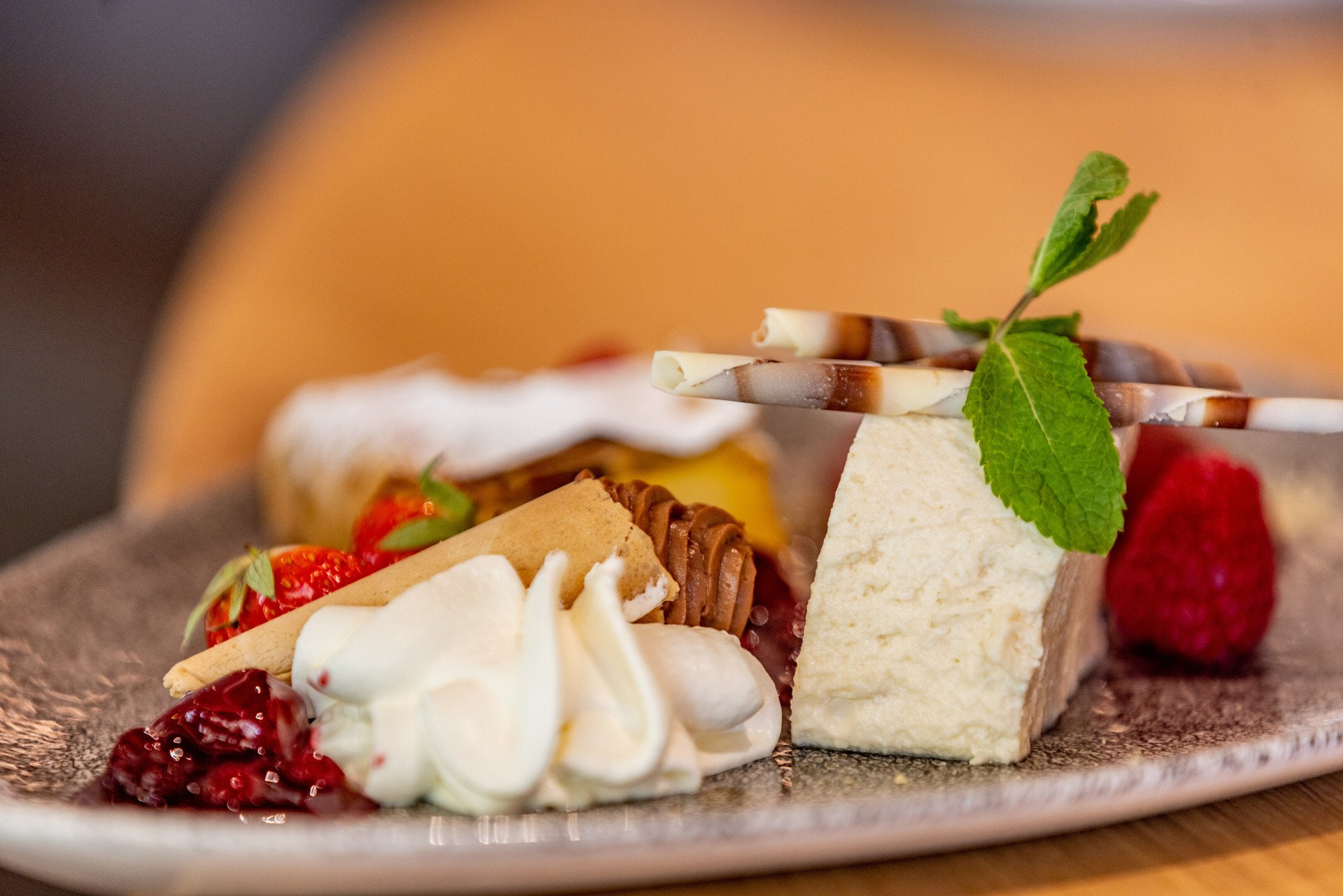Restaurant Specialist
Restaurant specialists serve guests in catering establishments. They advise on the selection of food and beverages, take orders, serve and collect the bill. They set the tables, welcome guests and also prepare larger events. Restaurant specialists work primarily in guest rooms and guest gardens of catering establishments. They usually wear professional clothing. They work in teams with colleagues, cooks, kitchen assistants, buffet and bar staff and have contact with their guests.
The tasks of restaurant specialists vary depending on the type and size of the business (small, medium, large, restaurant, hotel, catering company, etc.) and the professional position (older designation e.g. sole waiter*in, head waiter*in, wine waiter*in). Primarily, they advise on the selection of food and beverages, serve and cashier
As part of the preparation activities, restaurant specialists set the tables. To do this, they place clean tablecloths and napkins on the tables, place cutlery and glasses and ensure that the decoration is attractive. Polishing the cutlery and glasses is also part of their job.
Restaurant specialists greet guests as they enter the establishment and escort them to their table. They present them with food and beverage menus, provide expert advice on selections, and take into account the guests' personal wishes and needs. After the guests have ordered food and beverages, restaurant specialists enter the corresponding codes for the table, food and beverages on computer-based cash registers (cashing). More and more often, this boning is already done directly at the table via corresponding handhelds (smartphones, tablets or own boning devices) Orders are thus automatically forwarded to the bar and kitchen and can be directly retrieved for billing.
As soon as the food and drinks have been prepared, restaurant specialists take them from the kitchen and bar staff and serve them to the guests. In upscale restaurants, they also perform various tasks at the guests' table or sideboard, such as filleting, carving, and flambéing.
When advising guests on the selection of food and beverages, restaurant specialists must be well informed about the composition of the food, ingredients and possible intolerances and be able to offer alternatives, such as other side dishes, if necessary. Aspects of sustainability are also becoming increasingly important in guest service, including knowing the origin of food (e.g., regionality), knowing about seasonal offerings, and also knowing whether food and ingredients are organically produced.
Upon completion of the meal sequence, Restaurant Specialists serve plates, silverware, and glasses, offer desserts, coffee, or other beverages, issue bills, and collect the bill amount or clear checks/credit cards. They then see guests off and prepare the table for the next guests.
Restaurant Specialists also take table reservations and advance orders and assist in compiling food and beverage menus. They settle daily sales, check and replenish inventories, and place reorders. When preparing special catering events and celebrations such as wedding receptions, birthday parties and banquets, they put together the food and beverage order, decorate the table and premises and ensure that everything runs smoothly.
Restaurant workers mostly wear professional clothing when they work. They serve a variety of food and beverages, arrange tables and chairs, use table linen, cutlery, plates, glasses and decorative items such as flowers and candles. They also work with special cutlery (e.g., carving knives or flambé cutlery). They use notepads or portable ordering computers to take orders. They use (mostly) computer-based cash registers to settle accounts. For reservations, they operate computers with their own reservation software.
Restaurant specialists work in the dining rooms and gardens of restaurants, inns, hotels and cafés. They work in teams with colleagues and other employees in the restaurant business, e.g. cooks (apprenticeship), kitchen assistants.
Restaurant workers often work evenings, holidays and weekends - when other people are out. They also often have to deal with stressful, unforeseen situations, such as when many guests arrive unannounced at the same time and want to be served. Standing for long periods and walking a lot requires a certain level of physical fitness, as does carrying food and drinks.
- Greet guests and escort them to the table
- lay out clean table linen, place cutlery, plates, glasses and table decoration
- present food and beverage menus, advise guests, accommodate individual requests
- Take orders, enter codes for food and beverages on computer-based cash registers, smartphones or tablets, or directly into cash registers
- Receive food and beverages from kitchen and bar staff and serve at table
- Perform additional upscale food service work, such as filleting, carving, flambéing
- Offer, prepare and serve additional services, such as coffee, tea, cheese, desserts, cocktails, etc.
- Serve plates, cutlery and glasses, issue invoices, collect invoice amounts
- Say goodbye to guests, prepare tables for the next guests
- Take table reservations and advance orders
- Compile food and beverage menus
- Settle daily sales
- Checking, replenishing and reordering stocks
- prepare and supervise special catering events (e.g. weddings, banquets)
- Establishments of the hotel and restaurant industry:
- Inns
- Restaurants
- Coffee houses
- Bars
- Catering companies
- Catering service of the Austrian Federal Railways
For restaurant specialists, continuing education means continuously acquiring additional knowledge and skills in the areas of tourism, gastronomy and the hotel industry (in particular, e.g., food and beverage knowledge, cooking, guest service, sales promotion).
The Vocational Training Institute (bfi) and the Economic Development Institute (WIFI) offer various continuing education opportunities and conduct preparatory courses for the final apprenticeship examination and the qualifying examination in the hospitality industry. It is also possible to take courses on business management topics, e.g. finance and accounting, marketing, sales, IT and foreign languages, which are also of interest to restaurant specialists.
There are also opportunities for further education in the areas of hotel and catering management or culinary arts within the framework of advanced courses, colleges or university of applied sciences degree programs.
Further education opportunities and higher qualification:
Every profession requires very specific technical and specialist knowledge, which is taught during training. In addition, there are also a number of requirements that are important in practically all occupations. These include: Reliability, honesty and punctuality, accurate and careful work, independent work, enthusiasm and a sense of responsibility. It is also hard to imagine today without the ability and willingness to work with others (teamwork skills) and a willingness to learn.
What other skills and characteristics are expected in THIS profession can vary greatly from company to company. The following list gives you an overview of other requirements that are often asked for.
Remember: Many of these requirements are also part of the training.
Physical requirements: What physical attributes are important?
- Mobility
- Good physical condition
Technical competence: What skills and knowledge are expected of me?
- Use and operation of digital tools
- Data security and data protection
- Knowledge of foreign languages
- Good powers of observation
- Good knowledge of German
- good memory
- numeracy and numeracy skills
Social competence: What do I need when dealing with others?
- open-mindedness
- willingness to help
- intercultural competence
- communication skills
- sociability
- critical faculties
- customer / client orientation
Self-competence: Which personal qualities should I bring along?
- Attention
- Ability to work under pressure / Resilience
- Flexibility / willingness to change
- Friendliness
- Patience
- Self-organization
Other requirements: What else is important?
- well-groomed appearance
- hygiene awareness
Methodological competence: Which ways of working and thinking are important?
- Coordination skills
- organizational skills
- systematic way of working


